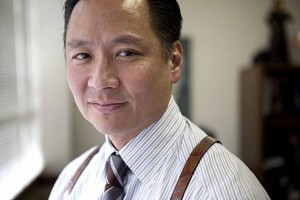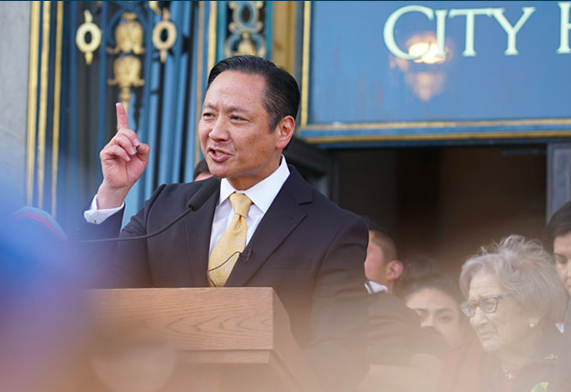
Jeff Adachi
In Jeff Adachi Case, a Tale of Two Different Autopsies
Conflict-of-interest with the medical examiner handling Adachi’s case?
By Matthew Keys, August 26, 2019 8:54 pm
Former San Francisco Public Defender Jeff Adachi died suddenly in February from a case of acute mixed drug toxicity exacerbated by a previously-unknown coronary disease.
That’s the official line from the autopsy conducted by the San Francisco medical examiner’s office, a finding that has since been contradicted by an independent autopsy conducted by Adachi’s family challenging the claim that the late public defender died largely from cocaine ingestion.
The independent autopsy results were released publicly last week by a lawyer retained by Adachi’s family. That autopsy, conducted by three separate medical professions, found Adachi’s heart disease was the primary factor in his death, something that was backed by anecdotal evidence found in the government’s autopsy report.
According to the medical examiner’s office, Adachi was having dinner with a female friend when he began sweating profusely and complaining of a stomach ache — symptoms attributed to cardiac arrest. He went to an apartment in San Francisco’s North Beach neighborhood where he became unresponsive and later died.
The medical examiner’s office said Adachi’s heart, already in a vulnerable state from the coronary disease, was strained by a mixture of drugs and alcohol. But the independent autopsy results showed Adachi’s death was attributed to his heart condition and that there were no measurable amounts of cocaine or alcohol in his body.
Bob Chan, the Adachi family’s attorney, told KGO-TV Adachi’s blood alcohol level, or BAC, was “.01 percent,” an amount that was “too low to even be quantified.”
“That’s the lowest reported level that you could possibly report,” Jim Norris, one of the medical experts who worked on the independent autopsy, told KGO. “In an average-sized man, that’s drinking about half a beer.”
Dr. Nicholas Lemos is another medical expert who worked on the independent autopsy. He told KGO that a blood test examined by the three-expert panel found “no cocaine” in Adachi’s body. A secondary blood draw showed only “trace” amounts of cocaine in Adachi’s system, the TV station reported last week.
So why the conflicting reports? Chan said it likely had to do with a conflict-of-interest with the medical examiner handling Adachi’s case: Christopher Wirowek, the agency’s director of operations, took the unusual step of observing Adachi’s body at the scene of his death on Feb. 22 and personally took over the case after learning the decedent was the county’s public defender.
Officials with the public defender’s office told KGO Wirowek should have recused himself from Adachi’s case because the former public defender had complained about Wirowek in the past, alleging the medical examiner had engaged in “dishonest conduct” by claiming it was accredited by the National Association of Medical Examiners when it was not. City officials investigated Adachi’s allegation and ultimately cleared Wirowek of wrongdoing.
The trio of medical examiners who took a second look at Adachi’s death are less interested in politics and more interested in accuracy. They say their findings “do not…support the notion of an acute mixed ethanol-cocaine death,” and one expert wrote the medical examiner’s office should have take additional steps to identify “an anatomic cause of death since there doesn’t appear to be any toxic drug combination present” in connection with Adachi’s passing.
It was not clear what, if any, additional action the Adachi family would take with the conclusion of the independent autopsy.
- Assemblywoman Jacqui Irwin Proposes Law to Authorize Withholding Autopsy Reports From Public Disclosure - February 28, 2020
- As AG Becerra Seeks Federal Recognition of Consumer Privacy Law, Companies Ask for Relief - February 26, 2020
- New Legislation Would Carve Out Additional Exemptions for Information from California Open Records Laws - February 24, 2020



